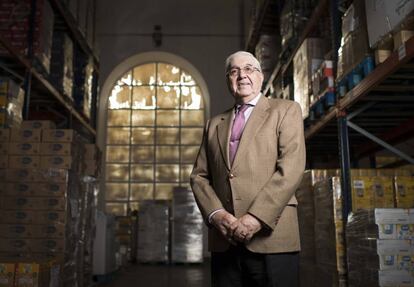A Madrileño’s career move from money bank to food bank
Francisco García, who found a new mission fighting poverty in the Madrid region, has high expectations for this year’s Christmas food drive

Around 300,000 people, equivalent to 5% of the Madrid region’s population, fall well below the poverty line, according to the Madrid Food Bank’s statistics. “We need 2,500 more volunteers to reach the 22,000 necessary to collect food for all these people,” says Francisco García on the eve of a Christmas food drive known as La Gran Recogida, or the Great Collection. “It’s not the same being at a collection point without volunteers. You get so much more if they’re there.”
As president of the Madrid Food Bank, García admits that he still gets nervous before this event. From Friday at midday until Sunday last weekend, 1,105 commercial establishments across the region gave up space for the containers that, for the sixth year running, were filled with non-perishable food items for families and individuals who can’t make ends meet.
The solidarity shown by people is something that I still find thrilling
Francisco García
Once a banker at the now-defunct Banco Hispano Americano, García began volunteering with the Madrid Food Bank 21 years ago, and has been its president for the last two and a half years. Originally from Puente Genil in Andalusia, his involvement grew when he was forced into early retirement. “They might both be banks, but they’re very different,” he says with a laugh. “I am now doing something positive for society, and the days just fly by.”
Despite a lack of volunteers in some corners of the region, the Madrid Food Bank was hoping to collect 2,700,000 kilograms of non-perishable foods such as pasta, rice, canned goods, oil, milk, salt, sugar and baby food, which would constitute 15% of the organization’s total annual collection.
“With what we get this weekend, as well as the perishable foods that are brought in daily, we should have enough for six or seven months,” says Francisco, adding: “Although it may seem that we have left the crisis behind us, this poverty is not shifting. I’m not an optimist. I don’t see the number of people in need dropping in our region.”
The Food Bank hands out food on a daily basis from more than 500 centers to 165,000 people
The Food Bank hands out food on a daily basis from more than 500 centers to 165,000 people. “You see it all,” says Francisco, who regularly visits the region’s food kitchens. “Families, children, the elderly; even people who are well dressed and who make you wonder how they’ve ended up here. It’s awful. When someone lines up for food, it is because they are really desperate and don’t have an alternative.”
After the collection, the donated food needs to be classified – a job that is carried out by temporary volunteers as well as the 410 who are on the job all year round. At the end of the day, a total of 3,000 volunteers will have been involved in the process and the work will take more than four months.
I’m not an optimist. I don’t see the number of people in need dropping in our region
Francisco García
“Organizing the pulses, the canned goods, and so on – that’s the job ahead of us now. School kids as well as companies and entire families come to help us get organized on weekends,” explains García. “The regional government gives us subsidies and offers space, but Madrid City Hall could collaborate a bit more. I’m sure they do their bit somewhere else, but it’s very important for people to have food.”
García is quick to praise Madrileños for their generosity in general, though. “When the Great Collection starts, they collaborate wholeheartedly. It’s wonderful,” he says. “And during the rest of the year, they don’t forget about us. They are many Operation Kilos and food is donated every week. The solidarity shown by people is something that I still find thrilling.”
English version by Heather Galloway.
Tu suscripción se está usando en otro dispositivo
¿Quieres añadir otro usuario a tu suscripción?
Si continúas leyendo en este dispositivo, no se podrá leer en el otro.
FlechaTu suscripción se está usando en otro dispositivo y solo puedes acceder a EL PAÍS desde un dispositivo a la vez.
Si quieres compartir tu cuenta, cambia tu suscripción a la modalidad Premium, así podrás añadir otro usuario. Cada uno accederá con su propia cuenta de email, lo que os permitirá personalizar vuestra experiencia en EL PAÍS.
¿Tienes una suscripción de empresa? Accede aquí para contratar más cuentas.
En el caso de no saber quién está usando tu cuenta, te recomendamos cambiar tu contraseña aquí.
Si decides continuar compartiendo tu cuenta, este mensaje se mostrará en tu dispositivo y en el de la otra persona que está usando tu cuenta de forma indefinida, afectando a tu experiencia de lectura. Puedes consultar aquí los términos y condiciones de la suscripción digital.








































